#tamil nadu agricultural university
Explore tagged Tumblr posts
Text
TNAU Recruitment 2022 Junior Research Fellow Vacancy
TNAU Recruitment 2022 Junior Research Fellow Vacancy #jobtamizhan #govtjobs #governmentrecruitment #centralgovtjobs #tnpsc #upsc #ssc
TNAU Recruitment 2022: Tamil Nadu Agricultural University (TNAU) has recently released the notification for the recruitment Tamil Nadu Agricultural University Junior Research Fellow Recruitment and the candidates who are interested and have the prescribed qualification, those candidates should go through the notification before applying the Tamil Nadu Agricultural University form online and read…
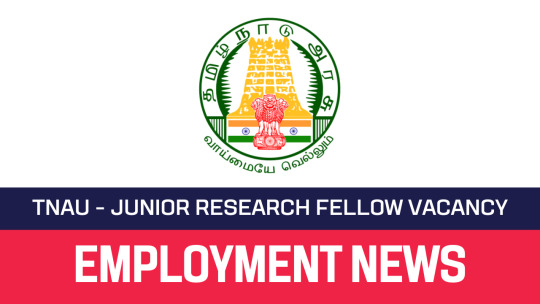
View On WordPress
#bsc agriculture university admission#tamil nadu agricultural university#tamil nadu agriculture university registration#tamilnadu agricultural university#tamilnadu agricultural university coimbatore#tamilnadu agriculture university#tamilnadu agriculture university admission open#tamilnadu agriculture university counseling 2022#TNAU Recruitment 2022 Junior Research Fellow Vacancy
0 notes
Text
தமிழக வேளாண்மை பல்கலைக்கழகத்தில் வேலை காலியாக உள்ள JRF பணிகள் நிரப்புவதற்கான அறிவிப்பு வெளியாகியுள்ளது
தமிழக வேளாண்மை பல்கலைக்கழகத்தில் வேலை காலியாக உள்ள JRF பணிகள் நிரப்புவதற்கான அறிவிப்பு வெளியாகியுள்ளது #govtjobs #upsc #ssc #currentaffairs #gk #ssccgl #ias #jobs #governmentjobs
TNAU Recruitment 2022 Apply JRF Notification: தமிழக வேளாண்மை பல்கலைக்கழகத்தில் வேலை காலியாக உள்ள JRF பணிகள் நிரப்புவதற்கான அறிவிப்பு வெளியாகியுள்ளது | தமிழ்நாடு அரசு அதிகாரப்பூர்வ அறிவிப்பினை வெளியிட்டுள்ளது. விண்ணப்பிக்க ஆர்வமுள்ளவர்கள் 09/12/2022 முதல் 16/12/2022க்குல் அஞ்சல் மூலமாக விண்ணப்பிக்கவும் விண்ணப்பிக்கும் நபர் விண்ணப்பிக்கும் முன்பு கீழே கொடுக்கப்பட்டுள்ள பணிக்கான கல்வித் தகுதி ,…
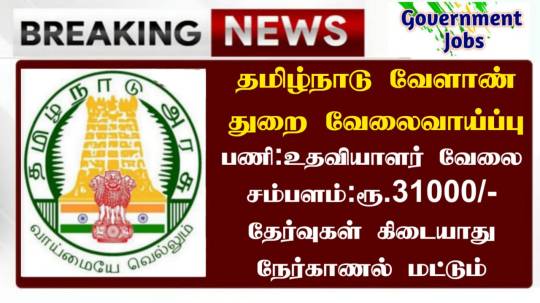
View On WordPress
#tamil nadu agricultural university#tamil nadu agricultural university (college/university)#tamil nadu agricultural university admission#tamil nadu agriculture university registration#tamilnadu agricultural university#tamilnadu agricultural university admission 2021#tamilnadu agricultural university coimbatore#tamilnadu agricultural university counselling#tamilnadu agriculture university#tamilnadu agriculture university admission 2022#TNAU Recruitment 2022 Apply Junior Research Fellow Posts
0 notes
Text
Teaching Faculty Jobs 27 October 2023 Announcement & Interview Notification By Faculty Tick
Central University of Tamil Nadu Applications are invited from eligible candidates for the following post of Teaching Faculty and Non Teaching Recruitment
Online applications are invited from excellent academic record and relevant work experience for recruitment to the Professor / Associate Professor/ Assistant Professor/ Deputy Registrar/ Personal Assistant/ Upper Division Clerk / Laboratory Assistant/ Lower Division Clerk post
Guru Ghasidas Vishwavidyalaya Applications are invited from eligible candidates for the following Teaching Faculty Recruitment
Applications are invited for faculty positions from eligible candidates at the level of Professor/ Associate Professor /Assistant Professor
Central University of Haryana Applications are invited from eligible candidates for the recruitment of Faculty Post for the teaching of UPSC (Preliminary &...
Applications are invited from excellent academic record and relevant work experience for recruitment to the Faculty post
Dr. Rajendra Prasad Central Agricultural University Applications are invited from eligible candidates for the following post of Teaching Faculty Recruitment
Applications are invited from excellent academic record and relevant work experience for recruitment to the Professor/ Associate Professor /Assistant Professor post
Sunbeam Academy group invited Applications from eligible candidates for the following post of Dean Academics/ Principal/ Vice Principal/ Teachers and Various Non Teaching Recruitment
Dean Academics/ Principal/ Vice Principal/ Post Graduate Teachers/ Trained Graduate Teachers/ Primary Teacher/ Pre Primary Teacher/ Part Time Sports Coach / STEM Educator/ Counsellor / Librarian/ Special Educator/ Front Desk Executive/ Dance Teacher / Dramatics Teacher/ Hostel Warden / DTP operator / Hostel Superintendent/ F&B Manager/ Estate Manager/ Graphics Designer/ Lab Attendant/ Gardener/ Office Boy
Sri Sharda Group of Institutions invited Applications from eligible candidates for the following post of Director /Teaching Faculty / TPO/ Admin Officer Recruitment
Applications are invited from excellent academic record and relevant work experience for recruitment to the Director / Professor/ Associate Professor/ Assistant Professor/ TPO/ Admin Officer post
ISBM College of Engineering invited Applications from eligible candidates for the following post of Teaching Faculty and Non Teaching Recruitment
Applications are invited from excellent academic record and relevant work experience for recruitment to the Professor/ Associate Professor/ Assistant Professor/ Placement Officer/ Physical Director / Technical Assistant / Lab Assistant / Assistant Librarian post
National Sports University Applications are invited from the eligible candidates for engagement of Contractual Faculty
Applications are invited from excellent academic record and relevant work experience for recruitment to the Assistant Professor post
VSB Group institutions Invites Application for the following Positions of Team Leader/Project Engineers/ QC / QS /Planning Engineers Recruitment
Applications are invited from excellent academic record and relevant work experience for recruitment to the Team Leader/Project Engineers/ QC / QS /Planning Engineers post
Excel Public School invited Applications from eligible candidates for the following post of TGT/ PGT/ Montessori Teachers/ PET Recruitment
Applications are invited from excellent academic record and relevant work experience for recruitment to the Trained Graduate Teachers / Post Graduate Teachers / Montessori Teachers post
Indian Institute of Information Technology Dharwad Applications are invited for regular faculty positions at the level of Assistant Professor, Associate Professor, and Professor
Online applications are invited from excellent academic record and relevant work experience for recruitment to the Professor/ Associate Professor /Assistant Professor post
Indian Institute of Information Technology, Lucknow invited Applications from eligible candidates for the following Non Teaching Post Recruitment
Online applications are invited from excellent academic record and relevant work experience for recruitment to the Registrar / Assistant Registrar / Junior Superintendent / Junior Engineer / Junior Assistant / Junior Technician post
Srinivasa Institute of Engineering and Technology Vacancy for the Post of Professors/ Associate Professor / Assistant Professor / Soft skill trainers / Librarian
Applications are invited from excellent academic record and relevant work experience for recruitment to the Professors/ Associate Professor / Assistant Professor / Soft skill trainers / Librarian post
VSB Group institutions invited Applications from eligible candidates for the following post of Accountant/Assistant Accountant/Purchase Manager/ Security Officer Recruitment
Applications are invited from excellent academic record and relevant work experience for recruitment to the Accountant/Assistant Accountant/Purchase Manager/ Security Officer post
PPG Institute of Technology invited Applications from eligible candidates for the following post of Teaching Faculty Recruitment
Applications are invited for faculty positions from eligible candidates at the level of Professor/ Associate Professor /Assistant Professor
IIT Delhi invites applications from individuals who belong to SC/ST/OBC-NCL/PwBD/EWS category for faculty positions at the level of Assistant Professor (Grade-I/II)
Online applications are invited from excellent academic record and relevant work experience for recruitment to the Assistant Professor post
Indian Institute of Technology (IIT) Mandi invites applications for Teaching Faculty positions in all disciplines
Applications are invited for faculty positions from eligible candidates at the level of Professor/ Associate Professor /Assistant Professor
National Institute of Technology Agartala invited online Applications from eligible candidates for the following post of Professor and Associate Professor Recruitment
Online applications are invited from excellent academic record and relevant work experience for recruitment to the Professor and Associate Professor post
National Institute Of Technology Andhra Pradesh invites eligible candidates for appearing in Walk in interview for the following Adhoc Faculty posts in CSE
Applications are invited from excellent academic record and relevant work experience for recruitment to the Adhoc Faculty post
Modern School Vasant Vihar (MSVV) invited Applications from eligible candidates for the following post of Principal Recruitment
Applications are invited from excellent academic record and relevant work experience for recruitment to the Principal post
BMS Institute of Technology and Management invited Applications from eligible candidates for the following post of Principal Recruitment
Applications are invited from excellent academic record and relevant work experience for recruitment to the Principal post
Uttaranchal University invited Applications from eligible candidates for the following post of Teaching Faculty and Deputy/ Assistant Director (Online Learning) Recruitment
Applications are invited from excellent academic record and relevant work experience for recruitment to the Deputy/ Assistant Director (Online Learning) / Assistant Professors/Associate Professors/Professors post
ICFAI Foundation for Higher Education Hyderabad invited Applications from eligible candidates for the following post of Teaching Faculty Recruitment
Applications are invited for faculty positions from eligible candidates at the level of Professor/ Associate Professor /Assistant Professor
Indian Institute of Technology Gandhinagar Online applications are invited from Indian Nationals for appointment to following Various Non Teaching posts on Direct Recruitment
Librarian /Deputy Librarian /Assistant Librarian /Superintending Engineer /Medical Officer /Assistant Engineer /Junior Technical Superintendent /Senior Library Information Assistant /Assistant Staff Nurse /Junior Laboratory Assistant
#faculty tick#teaching jobs#faculty jobs#government jobs#facultyjobs#faculty jobs 2023#jobs in india#faculty tick jobs#teaching jobs 2023#jobs
2 notes
·
View notes
Text

Top 7 BSc Agricultural Colleges in India
Here are the top 7 B.Sc Agriculture Colleges in India:
Indian Agricultural Research Institute (IARI), New Delhi: Known for its excellent research facilities and strong academic programs.
Tamil Nadu Agricultural University (TNAU), Coimbatore: Offers comprehensive agricultural education and has a great campus.
Acharya N. G. Ranga Agricultural University (ANGRAU), Guntur: Renowned for its research and development in agriculture.
Punjab Agricultural University (PAU), Ludhiana: One of the oldest agricultural universities in India with a strong focus on research.
Maharashtra Animal and Fishery Sciences University (MAFSU), Nagpur: Specializes in animal sciences and fisheries along with agriculture.
University of Agricultural Sciences (UAS), Bangalore: Offers a wide range of programs in agriculture and related fields.
Gujarat Agricultural University (GAU), Gandhinagar: Known for its innovative approaches to agricultural education and research.Readmore
0 notes
Text
தமிழகம் முழுவதும் வடகிழக்கு பருவமழை சராசரி அளவு பெய்யும்: வேளாண் பல்கலை.கணிப்பு | Northeast Monsoon rainfall average across Tamil Nadu says University of Agriculture
கோவை: “தமிழ்நாட்டில் வடகிழக்கு பருவமழை அனைத்து மாவட்டங்களிலும் சராசரி அளவு பெய்யும்” என தமிழ்நாடு வேளாண்மை பல்கலைக்கழகம் கணித்துள்ளது. இதுகுறித்து, பல்கலைக்கழகம் வெளியிட்டுள்ள செய்திக்குறிப்பு: “எதிர்வரக்கூடிய 2024-ம் ஆண்டின் வடகிழக்குப் பருவமழைக் காலத்துக்கான (அக்டோபர் முதல் டிசம்பர் வரை) மழை பற்றிய முன்னறிவிப்பு செய்வதற்காக தமிழ்நாடு வேளாண்மை பல்கலைக்கழகத்தில் உள்ள வேளாண் காலநிலை ஆராய்ச்சி…
0 notes
Text
PM Modi releases 109 high-yielding, climate-resilient, and biofortified seed varieties New Delhi, Aug. 11 -- Prime Minister Narendra Modi on Sunday launched 109 high-yielding, climate-resilient, and biofortified seed varieties aimed at enhancing farm productivity and improving farmers' incomes. Developed by the Indian Council of Agricultural Research (ICAR) and state agriculture universities, these seeds cover 61 crops, including 34 field crops and 27 horticultural varieties. Mint first reported this development on 9 August. According to a statement from the agriculture ministry, Modi launched the seeds at three experimental agriculture plots on Delhi's Pusa Campus and also interacted with farmers and scientists. The field crop varieties include cereals, millets, forage crops, oilseeds, pulses, sugarcane, cotton, and fiber crops. For horticulture, the Prime Minister introduced new varieties of fruits, vegetables, plantation crops, tubers, spices, flowers, and medicinal plants. One of the 109 seed varieties released is CR Dhan 416, a rice variety ideal for coastal saline areas. It yields 48.97 q/ha and matures in 125-130 days. This variety is moderately resistant to brown spot, neck blast, sheath rot, rice tungro disease, and glume discoloration, besides offering full resistance to brown plant hopper, grasshopper and stem borer. Modi also released a durum wheat variety, suitable for Maharashtra, Karnataka, and the plains of Tamil Nadu. Adapted for irrigated conditions, it has an average grain yield of 30.2 q/ha. This variety is tolerant to terminal heat, resistant to stem and leaf rusts, and biofortified with higher levels of zinc (41.1 ppm) and iron (38.5 ppm). It also contains 12% protein. Among the field crops, new varieties of barley, maize, sorghum, pearl millet, and finger millet were also released. In pulses, new varieties of chickpea, pigeon pea, lentils, and mungbean were introduced. The chickpea varieties are suitable for timely sown, rainfed, or irrigated conditions in the Rabi season within the North East Plain Zone (NEPZ). They yield 17.79 q/ha and mature in 130 days. These varieties are moderately resistant to wilt, collar rot, and stunt, and are tolerant to pod damage. "Among the 69 field crops, there are 23 cereal seed varieties, including rice, wheat, barley, maize, sorghum, pearl millet, finger millet, proso millet, and barnyard millet," Union agriculture minister Shivraj Singh Chouhan told reporters. These are climate-friendly seeds and are designed to thrive in adverse weather conditions and offer high nutritional value, Chouhan added. According to the ministry, 11 varieties of pulses have been released, including chickpea, pigeon pea, lentil, field pea, faba bean, and mungbean. Additionally, seven oilseed varieties, such as safflower, soybean, groundnut, and sesame, and seven forage crops, including forage pearl millet, berseem, oats, forage maize, and forage sorghum, have also been introduced. The PM also introduced four sugarcane varieties, six fibre crops, including cotton and jute, and 11 potential crops, such as buckwheat, amaranth, winged bean, adzuki bean, pillipesara, kalingda and perilla. The ministry said 40 new horticultural crops have also been introduced, covering fruits, vegetables, tuber crops, spices, plantation crops, flowers and medicinal plants.
0 notes
Text
Why Buying Property in Madurai is a Smart Investment

Madurai, one of the oldest continuously inhabited cities in the world, has a unique blend of historical significance, cultural richness, and modern development. If you're considering investing in real estate, Madurai offers a plethora of opportunities that make it an attractive choice. Here's why buying property in Madurai is a smart investment.

1. Strategic Location and Connectivity
Madurai is strategically located in Tamil Nadu, with excellent connectivity to major cities like Chennai, Bangalore, and Coimbatore. The city is well-served by road, rail, and air transport, making it easily accessible from various parts of the country. The presence of Madurai International Airport adds to its connectivity, facilitating domestic and international travel.
2. Economic Growth and Development
Madurai has witnessed significant economic growth over the years, with the establishment of various industries, educational institutions, and IT parks. The city’s economy is diverse, encompassing manufacturing, tourism, textiles, and agriculture. This economic stability attracts professionals and businesses, increasing the demand for residential and commercial properties.
3. Educational Hub
The city is home to several reputed educational institutions, including Madurai Kamaraj University, Thiagarajar College of Engineering, and American College. The presence of these institutions draws students from across the country, creating a steady demand for rental properties and student housing. When considering to buy property in Madurai, proximity to these institutions can be a significant advantage.
4. Cultural and Historical Significance
Madurai is renowned for its rich cultural heritage and historical landmarks, such as the Meenakshi Amman Temple, Thirumalai Nayakkar Palace, and Gandhi Memorial Museum. The city's vibrant cultural scene and annual festivals attract tourists and culture enthusiasts, boosting the hospitality and real estate sectors.
5.Upcoming Infrastructure Projects
Madurai is set to benefit from several upcoming infrastructure projects, including the expansion of the Madurai airport, new highway developments, and the introduction of smart city initiatives. These projects are expected to enhance the city’s infrastructure, improve connectivity, and boost property values.

Conclusion
Investing in property in Madurai is a wise decision for several reasons, including its strategic location, economic growth, affordable prices, and cultural significance. The city’s ongoing development projects and improving infrastructure further enhance its appeal as a real estate investment destination. Whether you are looking for a place to call home or an investment opportunity with promising returns, Madurai offers a wealth of options to explore. When you decide to buy property in Madurai, you are choosing a city with immense potential and a bright future.
0 notes
Text
Gandhigram Rural Institute: A Legacy of Rural Development and Education

Located in the serene surroundings of Dindigul, Tamil Nadu, Gandhigram Rural Institute (GRI) is considered a pioneer in rural development and education. It was established in 1956 by a group of committed Gandhians led by Dr. T.S. Soundaram and Dr. G. Ramachandran, GRI was intended to be a breeding ground for rural development rooted in the principles of Mahatma Gandhi. Over the years, it has evolved into a renowned university making immense contributions to education, research, and rural development.
A Visionary Foundation:
Gandhigram Rural Institute was established with a mission to promote rural development through education and strengthen rural communities. The institute embodies Gandhian values and focuses on self-reliance, sustainability, and service to the community. The founders had a vision of an educational institution that would not only impart academic knowledge but also provide students with practical skills to address rural issues.
Academic Excellence:
GRI offers a wide range of Bachelor's, Master's, and Doctoral programs in various fields. These include Rural Development, Agriculture, Engineering, Natural Sciences, Social Sciences and Humanities. The curriculum is designed to combine theoretical knowledge with practical application, ensuring that students are well-prepared to address the challenges of rural development. One unique aspect of
GRI's academic program is its emphasis on experiential learning. Students are encouraged to participate in fieldwork, community projects, and internships that provide them with hands-on experience in rural areas. This approach helps students gain a deep understanding of rural issues and develop the skills necessary to develop effective solutions.
Research and Innovation:
Research is the cornerstone of GRI's mission. The Institute is committed to solving rural problems through innovative research and development. Various research centers and research departments have been set up focusing on areas like sustainable agriculture, rural health, renewable energy, and rural industries. These research initiatives aim to develop practical solutions that can be implemented at the grassroots level and directly benefit rural communities.
A notable research initiative is the Future Research Centre which studies emerging trends and technologies that can impact rural development. Through such efforts, GRI continues to be at the forefront of addressing current challenges in rural India.
Community Engagement:
True to its mission, GRI places a strong emphasis on community engagement and outreach. The institute works closely with local communities, government agencies, and non-governmental organizations to implement development projects. These projects range from agricultural development and water management to health and education programs. students and faculty members actively participate in these efforts, gaining valuable insights and contributing to the improvement of rural areas. This hands-on work develops students' sense of responsibility and commitment towards rural development.
Campus Life and Facilities:
GRI campus is a vibrant community that offers a holistic educational experience. The campus is spread over a large area and features well-equipped classrooms, modern laboratories, and a well-equipped library. The institute also has various facilities like hostels, sports facilities, and a health center to ensure a comfortable and conducive learning environment.
Cultural and extra-curricular activities are an integral part of life at GRI. The institute encourages students to participate in various clubs, societies, and events that promote creativity, leadership, and teamwork. These activities provide students with a platform to showcase their talents and develop important life skills.
Alumni and their impact:
GRI alumni have made significant contributions to rural development and various other fields. Many hold important positions in government, academia, and non-profit organizations and continue to advocate for rural development. The Institute is proud of its alumni, who attest to the high quality of education and training provided at GRI.
Conclusion:
Gandhigram Rural Institute is a testament to the continuing relevance of Gandhian principles in contemporary education and rural development. Our commitment to academic excellence, research, and community engagement has made us a pioneer in rural development education. Though GRI has evolved and broadened its horizons, it has remained true to its founding vision of empowering rural communities and promoting sustainable development. For those passionate about making a difference in rural India, GRI offers a unique and transformative educational experience.
0 notes
Text
TMV 7 Sesame!
Published in the August 2019 Issue Sesame has been a significant crop since ancient times. Known for its high oil content, sesame oil is a valuable cooking oil, often referred to as “gingelly oil,” and is also important in the production of medicines and beauty products. Sesame oil cake is used as livestock feed. The TMV 7 sesame variety, released by Tamil Nadu Agricultural University in 2009, is…

View On WordPress
0 notes
Text
10 Top Universities in India in 2024
The 10 top universities in India in 2024 are those delivering courses in traditional, non-distance format and are duly accredited, chartered or licensed by proper Indian higher education-related organizations. These universities offer minimum 3-year Bachelor’s programs, postgraduate masters or doctoral degrees. Read on to know more about the 10 top universities in India in 2024.

KIIT, Bhubaneswar, Odisha
With 30 world class campuses; 3, 000+ faculty & researchers, 40, 000+ students, 18 sports complexes with swimming pools, 30 food courts and 36 square kilometers of academic township, KIIT or the Kalinga Institute of Industrial Technology is one of the top 10 universities in India in 2024. Though a very young institute with its inception in 1992, KIIT has performed exceptionally well in the rankings conducted by several national and international associations and is ranked number 1 by the Atal Ranking of Institution on Innovation Achievements. The institute offers more than 200 academic programmes, including undergraduate, postgraduate and virtual summer internship courses.
Indian Institute of Technology, Bombay
Established in 1958, the Indian Institute of Technology, Bombay is recognised bu the Department of Higher Education of the Ministry of Human resources Development of India. It offers bachelors, masters and doctorate degrees alongside online courses, distance learning opportunities and exchange and study abroad programmes.
IISC or Indian Institute of Science, Bangalore
This public university in Bangalore offers undergraduate, postgraduate and doctoral-level courses in Management, Design, Science and Engineering. Also called the Tata Institute, its campus is spread over an area of 400 acres.
Anna University, Chennai, Tamil Nadu
Founded in 1978 by the merger of a few elements of University of Madras and four Chennai technical institutions, this university is named after the state’s chief minister C.N. Annadurai. The university is best known for its rainwater harvesting systems and bike-sharing schemes.
Mahatma Gandhi University, Kottayam, Kerala
Popularly called MGU, this Indian public university offers a huge selection of academic programmes, including undergraduate, postgraduate and doctoral courses. It is an active member of the Association of Commonwealth Universities.
Indian Institute of Foreign Trade
Founded in 1963, this non-profit public university is recognized by the University Grants Commission of India and features a selective admission policy based on entrance examinations.
Delhi Technological University
An extremely selective institution with an acceptance rate ranging between 0-9 %, this university in New Delhi even welcomes international students to apply for its undergraduate, postgraduate and doctoral programmes.
Indian Agricultural Research Institute
Established in 1905, this Indian university offers a plethora of academic and non-academic services and facilities to students, including housing, financial aids, sports facilities, scholarships, library and study abroad and exchange programs.
Guru Gobind Singh Indraprastha University
Officially recognized by the University Grants Commission of India, this large-sized co-educational institution is known for the exemplary academic records and grades of its past students.
Dr. Ram Manohar Lohia Avadh University
Formed in 1975, the RMLAU is popular for its academic programmes and its faculty that consists of members from some of the most established higher education institutes in India.
Conclusion
So, there you have it! The top 10 universities in India in 2024 guarantee the best of higher education and other non-academic facilities.
0 notes
Text
Exploring Coimbatore: The Manchester of South India
Nestled in the foothills of the Western Ghats, Coimbatore, fondly known as the “Manchester of South India,” is a bustling city that beautifully blends tradition with modernity. From serene temples to vibrant markets and lush green landscapes, Coimbatore offers a variety of attractions for every type of traveler. Here’s a guide to some of the must-visit places in this charming city Coimbatore . Also if you to do some activity in coimabtore . Then see the blog – Things to do in Coimbatore.

1. Marudamalai Temple
Perched on a hill about 12 kilometers from the city center, Marudamalai Temple is a revered shrine dedicated to Lord Murugan. The temple is surrounded by scenic beauty and offers a tranquil escape from the city’s hustle and bustle. The climb to the temple, whether by foot or by vehicle, provides panoramic views of the surrounding landscape.

2. VOC Park and Zoo
Named after the freedom fighter V. O. Chidambaram Pillai, VOC Park and Zoo is a perfect spot for families. The park features a variety of recreational activities, including a toy train and a play area for children. The zoo, though small, houses an interesting collection of animals and birds, making it a delightful visit for kids and adults alike.
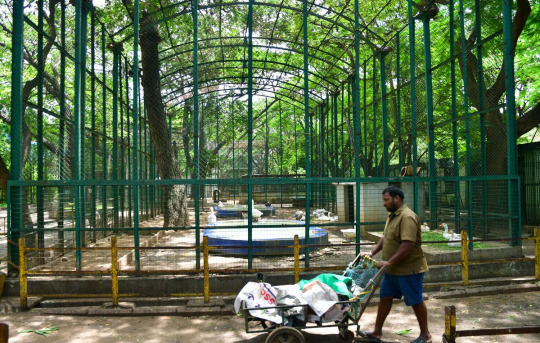
3. Perur Pateeswarar Temple
One of the oldest and most significant temples in Coimbatore, the Perur Pateeswarar Temple is dedicated to Lord Shiva. Known for its exquisite Dravidian architecture, intricate carvings, and historical significance, the temple is a spiritual haven for devotees and a marvel for architecture enthusiasts.
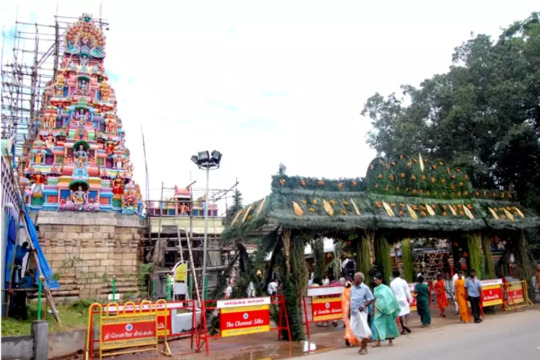
4. Gass Forest Museum
Located within the Forest College campus, the Gass Forest Museum offers a unique glimpse into the flora and fauna of the region. The museum, established in 1902, houses an extensive collection of taxidermy specimens, botanical samples, and artifacts related to forestry. It’s an educational and intriguing destination for nature lovers.
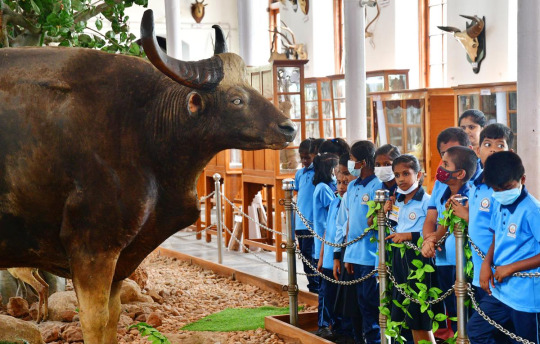
5. Brookefields Mall
For those who enjoy shopping and entertainment, Brookefields Mall is the place to be. This modern shopping complex features a wide range of retail outlets, eateries, and a multiplex cinema. It’s a great spot to relax, shop for souvenirs, and enjoy some leisure time.

6. Adiyogi Shiva Statue
A short drive from Coimbatore, the Adiyogi Shiva Statue at the Isha Yoga Center is a must-visit. Standing at 112 feet, this massive statue of Lord Shiva is not only a stunning piece of art but also a symbol of inner peace and well-being. The surrounding landscape and the tranquil atmosphere make it a perfect spot for meditation and reflection.

7. Siruvani Waterfalls and Dam
Located about 35 kilometers from Coimbatore, Siruvani Waterfalls and Dam are famous for their picturesque beauty and sweet-tasting water. The drive to the falls through lush green forests is an experience in itself. The serene environment and the cool waters of the falls provide a refreshing retreat from city life.
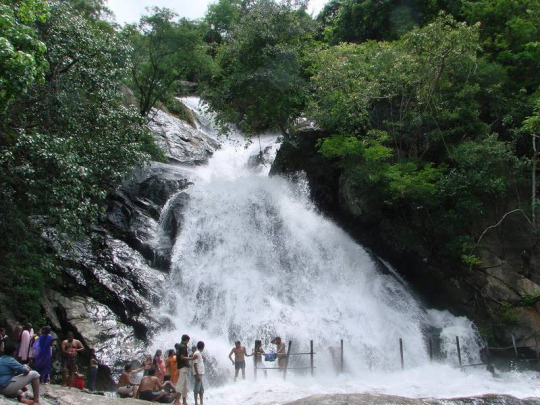
8. Eachanari Vinayagar Temple
This ancient temple, dedicated to Lord Ganesha, is one of the most visited religious sites in Coimbatore. The temple’s unique feature is its massive idol of Lord Ganesha, which stands at 6 feet tall and 3 feet wide. Devotees flock here to seek blessings and experience the temple’s serene ambiance.
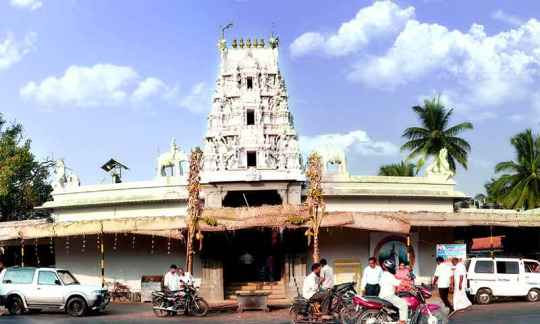
9. Tamil Nadu Agricultural University (TNAU) Botanical Garden
The botanical garden at TNAU is a verdant oasis in the heart of Coimbatore. Spread over 300 acres, the garden is home to a wide variety of plants, trees, and flowers. It’s a perfect spot for a leisurely stroll, a picnic, or simply to enjoy the beauty of nature.
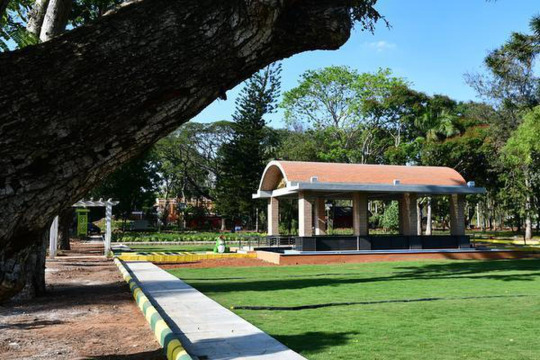
10. Kovai Kutralam Falls
Also known as Kovai Courtallam, this waterfall is located in the Siruvani hills and is a popular tourist spot. The falls are surrounded by dense forests, and the area is well-maintained by the forest department. It’s an ideal place for a day trip, offering opportunities for trekking, photography, and relaxation by the cascading waters.

Conclusion
Coimbatore, with its rich cultural heritage, natural beauty, and modern amenities, has something to offer for everyone. Whether you’re a history buff, nature enthusiast, shopaholic, or spiritual seeker, this city will captivate you with its charm and diversity. So pack your bags and get ready to explore the myriad attractions of Coimbatore, a city that promises an unforgettable experience.
0 notes
Text
PhD Registration in Tamil Nadu 2024
Tamil Nadu, known for its rich cultural heritage, vibrant traditions, and thriving academic institutions, stands as a beacon of higher education in India. Within this dynamic landscape, pursuing a doctoral degree, or PhD, holds immense prestige and significance. However, the journey towards PhD registration in Tamil Nadu entails navigating a complex process that involves admission procedures, entrance examinations, and selection criteria. This article serves as a comprehensive guide to understanding the PhD registration process in Tamil Nadu, highlighting the admission process, PhD entrance examinations, and top colleges for PhD studies in the state.
PhD Admission Process in Tamil Nadu:
The admission process for PhD programs in Tamil Nadu Chennai typically begins with aspiring candidates identifying their research interests and exploring potential research areas. Prospective applicants are encouraged to review the academic offerings and faculty expertise of various universities and research institutions in Tamil Nadu to identify the most suitable programs for their research aspirations.
Once candidates have identified their preferred PhD programs and institutions, they must familiarize themselves with the specific admission requirements and eligibility criteria set forth by each institution. These criteria may vary depending on factors such as academic qualifications, research experience, and performance in entrance examinations.
In general, candidates seeking admission to PhD programs in Tamil Nadu are required to hold a master's degree in a relevant field from a recognized university or institution. Additionally, they may be required to demonstrate proficiency in the English language through standardized tests such as the TOEFL or IELTS, especially for international applicants.
Furthermore, candidates are typically required to submit a research proposal outlining their intended research objectives, methodology, and potential contributions to the field. This research proposal serves as a critical component of the application process and is evaluated by admissions committees to assess the candidate's research aptitude and suitability for the PhD program.
PhD Entrance Examinations:
In Tamil Nadu, many universities and research institutions conduct entrance examinations as part of the PhD admission process. These entrance examinations serve as a means of assessing the academic aptitude, subject knowledge, and research potential of prospective candidates.
The format and structure of PhD entrance examinations in Tamil Nadu may vary depending on the institution and field of study. In some cases, entrance examinations may consist of multiple-choice questions testing the candidate's proficiency in the chosen subject area. In other cases, candidates may be required to write a research proposal or essay demonstrating their understanding of the research topic and their ability to conduct independent research.
Top Colleges for PhD in Tamil Nadu:
Tamil Nadu is home to several prestigious universities and research institutions that offer PhD programs across a wide range of disciplines. These institutions are renowned for their academic excellence, research infrastructure, and faculty expertise, making them highly sought-after destinations for doctoral studies.
One such institution is the Indian Institute of Technology Madras (IIT Madras), located in Chennai. IIT Madras offers PhD programs in various engineering, science, humanities, and management disciplines, attracting top talent from across the country and around the world.
Another prominent institution in Tamil Nadu is the University of Madras, one of the oldest and most esteemed universities in India. The University of Madras offers PhD programs in fields such as arts, science, commerce, and management, providing students with access to world-class faculty and research facilities.
Additionally, the Tamil Nadu Agricultural University (TNAU), located in Coimbatore, is renowned for its agricultural research and education programs. TNAU offers PhD programs in agricultural sciences, horticulture, and related disciplines, providing students with opportunities to engage in cutting-edge research and contribute to agricultural innovation and sustainability.
Conclusion:
In conclusion, pursuing a PhD registration in Tamil Nadu is a rewarding and intellectually stimulating endeavor that offers aspiring scholars the opportunity to engage in advanced research and contribute to the advancement of knowledge in their chosen field. By understanding the admission process, PhD entrance examinations, and top colleges for PhD studies in Tamil Nadu, prospective candidates can navigate the path towards doctoral registration with confidence and clarity. As Tamil Nadu continues to uphold its reputation as a hub of higher education and research excellence, the pursuit of a PhD in the state remains a highly esteemed and sought-after academic endeavor.
0 notes
Text
Group Discussion
Team: The National UN Volunteers-India
THE ATTENTION SPAN OF CHILDREN IS NOW ONLY TO A MAXIMUM OF TWELVE MINUTES. SO INSTEAD OF MINUTE OR ONE-HOUR CLASSES, IF WE MAKE EACH PERIOD 30 MINUTES AND TWICE THE SUBJECT PERIOD ONE IN THE FORENOON AND THE OTHER IN THE AFTERNOON, WILL IT BE MORE EFFECTIVE?
EARLIER THE SPAN WAS MORE THAN 25 MINUTES, AND SO EACH PERIOD WAS DESIGNED TO BE 45 MINUTES, AND FOR HIGHER CLASSES, 1 HOUR. COMMENTS, SUGGESTIONS, AND CRITICISMS ARE WELCOME.
Conversation Initiator: Dr. Sekar Srinivasan, UN Educationist.
❄️ Ms. Priyanka Sharma: Decreasing class periods to 30 minutes and distributing them throughout the day could better suit shorter attention spans. However, effectiveness relies on factors like curriculum design, engagement methods, and teacher flexibility. Balancing individual learning requirements and the scope of content covered is vital.
❄️Dr. Balasubramanian: Decreasing class time/periods, decreasing syllabus, decreasing difficulty level questions decrease stress for students in different dimensions, making the future generations very lazy.
Mainly in Tamil Nadu, a few years back, they reduced the syllabus (and called it SAMACHEER) and made (or spoiled) thousands of students easily score 100% in maths, science, English, Tamil, history, geography, etc. Later, many entered engineering colleges. The common public doesn’t understand the secrets since engineering colleges are empty, and each village has a college. They need a 70% score (some formula connecting maths, physics, chemistry) for medicine and agriculture (physics, chemistry, biology), many demanding government students with poor performance, and seats are not filling.
The question is, what is the score? It’s an output of an examination with a prescribed syllabus? Our educationists are smart, and at the same time, politicians are very smart. They made the syllabus (reduced size) and revised question models so that all can pass the examinations (with charming scores - and don’t ask the quality, and they won’t go to the other board exams). Scores easily, and no need to come to schools; there is no need to attend the term exams, etc.
Finally, the results are they got admission to the higher institutions and cannot walk easily, and sadly, many poor results in the first year of engineering and even suicide rates become higher!
There is a joke in a movie/business:
"If you don’t have the price of the laddu, I shall produce the laddu as per the money (cost) you have."
Sadly, we should not apply this to education, discipline, and health; never compromise with conveniences and comforts.
Students should increase the quality of sleep, the quality of food, perhaps listening skills, etc., and can get benefits (quality) of teaching hours. If the amount of time decreases, maybe a profit for the institutions and students (and perhaps to teachers, by getting better exercise in shifting one classroom to another - hope teachers should ask for any benefit and work like a robot).
Technically, we don’t think this much, and very soon conventional teaching systems will collapse, and machine learning and AI will occupy teaching and kick conventional classroom learning, perhaps the Corona period gave a big example for the transformations. Even many universities started the credit system methodology, and the British System IGCSE exercised these methods for many years.
❄️Dr. Sekar Srinivasan: Your logic seems okay. But actually, I am not decreasing but effectively increasing it by 15 minutes. Recently, I was in Jinju, South Korea. Their actual lectures for any subject are only 20 minutes.
❄️Dr. Murthy: The creativity, the individuality, the smartness, the beautiful lifestyle, etc., had disappeared because of the recent education system. We agree with these contents and feelings.
❄️Mr. Suhail Ahmed: If the retention time is 12 minutes, then as per logic, class duration should be hardly 15 minutes. Why 20 minutes in Korea?
❄️Dr. Sekar Srinivasan: Actual introduction, assignments verification, interaction, they spend 5 minutes each.
❄️Dr. Balasubramanian: Lecturing the current topics won’t take much time, and most of the time wasted for preparations is itself, and mainly the language and some necessary memory of previous term/year contents (some again ask memory is not necessary and thinking, etc., so on is another topic).
Instead of discussing from a teacher's point of view, we make hundreds of suggestions and not discussing, improving the learning skills and preparation skills of a student.
If a student is not enough or not calibre or not interested to shift nice/competitive domains, let him/her choose each road/easy lane to drive, never drive slow on a speed track, and if one likes to fly should (attach) to have wings.
How one can be good and fix for policemen/lawyer/judge/medical surgeon/pilot, cricket player, or actor or extra… any job domains.
Parents and students, if they spend quality time in preparations, like good discussions and have good sleep, and even 30 minutes too not necessary for the teacher, and even the textbook and some guidance are very sufficient.
Most of the Japanese schools have a project and paper presentation in schools and colleges, and in India even MPhil/PhD can get a degree without a paper presentation (and hope in NEP the conditions were revised), and the same in the UK and USA many PG qualifications are research-based and not classroom teaching!
Even one member posted a comment; many are interested in collecting certificates in a Zoom training, though in higher job positions!
I exercised, very fortunately by getting a chance to teach once for the class 5, in a CBSE school, just read the maths textbook and discuss all mathematical words, and students start doing by themselves with some tips and preparations and even stopped being given homework, and many finished the exercises in the class hour, and even the class averages also improved much. So don’t spend time teaching and kindly spend time making them learn.
Parents, teachers, (and sadly some) principals, and management too understand and accept that the classroom is not like an engineering/production unit to have a uniform output, like making screws and nuts with zero% error. And all 20 or 40 students shall not fix for the same job or same domain, and each has different biological/sociological/psychological backgrounds, and at the same time learning and improvement should not be stopped for any reason and focus for growth.
When we compare with others, that’s good for improvement and growth, and at the same time, we have to analyze the background and other parameters too, seriousness of the students, role of parents, role of the government policy, government, and school budget, etc., and geographically like city/town/urban/panchayat, etc.
Panchayat area they have a lot of playground area, and they are well done with physical and in the city, we don’t have space for ground toilets and parking and cannot imagine a football/basketball ground. Anyway, going through some discussions shall help for growth, sir. Thanks for your valuable time and suggestions, sir
❄️Mrs. Anuradha: Every class should essentially start with a warm-up activity, then recapitulation of previous knowledge leading to the introduction of the topic, then the concept or main idea is explained. To check the understanding of the students, we have the questioning session, then remedial teaching and providing assignments. If all these stages are followed, then I doubt 30 minutes will be sufficient.
❄️Dr. Sekar Srinivasan: Online teaching experience as well as digital presentation is limited to ten to twenty-minute modules only. Most of the advanced schools already started having teaching experts as well as tutors for follow-up measures for each subject, which is found to be more effective.
❄️Mrs. Anuradha: Then block periods, one in a week will help.
❄️Mr. Subhah Chandra Vohra: Reducing the duration of periods to 30 minutes and increasing the number of periods may actually backfire as change of teachers so frequently will result in a lot of time wastage. Moreover, it may still be considered for primary and middle classes but onwards it will prove to be a disaster. The present practice in a good number of schools in this part of the country is to allocate two periods of 40-45 minutes together so that the teacher may get a good time to explain the topic in hand without any interruption. Another factor to be taken into consideration is that all the students in a section don’t have a 12-minute attention span uniformly. Some have shorter than even 5 minutes. In such a scenario, it would be difficult to justify reducing the time span to match and suit the attention span of students. Another point worth pondering over is that the attention span increases and decreases according to the teaching style of teachers. Some wet blankets bore students to death and some make the students wait for their periods.
❄️Mrs. Nikitha Kothari: To add to the conversation, dealing with today's Gen Z, understanding their needs, mental status, SDG goals, it is the need of the hour.
❄️Mrs. T Sujatha: Even with a 45-minute duration class, the teacher can effectively split the class period as a 4-step Process of Perfection... 1. Engaging warm-up (5 min) 2. Teaching & Kinesthetic learning (20 min) 3. Accelerated learning (15 min) for control of error 4. Wrap up (5 min) All in the hands of the teacher.
❄️Mrs. Sabural Banu: Completely it cannot be since either an average teacher or average student would take a little more time to focus, grasp, etc. The ideal timing is 40 min/pd.

0 notes
Text
Top agriculture business management colleges in India

Indian Agricultural Research Institute (IARI), New Delhi:
Renowned for its pioneering research and education in agriculture.
Offers specialized programs in agricultural business management.
Provides a conducive environment for research, innovation, and industry collaboration.
National Institute of Agricultural Extension Management (MANAGE), Hyderabad:
Dedicated to enhancing managerial skills in agriculture and allied sectors.
Offers MBA in Agri-Business Management (ABM) with a focus on practical learning.
Facilitates internships, field visits, and industry interactions for hands-on experience.
Xavier School of Rural Management (XSRM), Bhubaneswar:
Focuses on rural development and agribusiness management.
Offers MBA in Rural Management with electives in agribusiness.
Emphasizes experiential learning through case studies and live projects.
Institute of Agri Business Management (IABM), Bikaner:
Affiliated with Rajasthan Agricultural University, known for its MBA in Agribusiness Management.
Equips students with skills in agricultural marketing, finance, and supply chain management.
Provides opportunities for industry exposure and practical training.
Tamil Nadu Agricultural University (TNAU), Coimbatore:
Offers MBA in Agri-Business Management focusing on agricultural marketing and finance.
Integrates theoretical knowledge with practical experiences through field visits and internships.
Collaborates with leading agricultural firms for research projects and industry insights.
Indian Institute of Management Ahmedabad (IIMA):
Offers a specialized Agri-Business Management Program (PGP-ABM).
Known for its rigorous curriculum, distinguished faculty, and industry partnerships.
Provides a platform for aspiring agribusiness leaders to gain managerial expertise.
Indian Institute of Management Lucknow (IIML):
Offers a Post Graduate Program in Agribusiness Management (PGP-ABM).
Focuses on developing managerial competencies specific to the agricultural sector.
Facilitates industry interactions, rural immersions, and live projects for practical exposure.
Institute of Rural Management Anand (IRMA):
Offers a flagship program, Post Graduate Diploma in Rural Management (PGDRM).
Emphasizes agribusiness management along with rural development.
Collaborates with leading organizations for research, training, and consulting projects.
Amity Institute of Organic Agriculture (AIOA), Noida:
Specializes in organic agriculture and sustainable agribusiness practices.
Offers undergraduate and postgraduate programs in agricultural business management.
Focuses on environmental sustainability, organic farming techniques, and market-driven strategies.
International Institute of Business Studies (IIBS), Karnataka:
Offers PGDM in Agri-Business focusing on global agricultural markets and trade.
Provides a blend of classroom learning, industry exposure, and international collaborations.
Equips students with cross-cultural competencies and strategic insights for global agribusiness management.
These institutions are at the forefront of agricultural business education in India, providing comprehensive programs, industry exposure, and practical training to groom professionals for the evolving agricultural landscape.
#business#agriculteurs#bestcolleges#top10college#topindiacollege#bestindia#india#management#businessmanagement
1 note
·
View note
Text
youtube
Bba Colleges in Patna Admission Experts Discover premier BBA colleges in India with comprehensive information on admissions, fees, and rankings. AdmissionExperts guides you towards making informed choices for a successful business education."
Top BBA Colleges in India comprise more than 2300 private and 600 government colleges and institutes. Some of the major states of India such as Maharashtra, Madhya Pradesh, Punjab, Rajasthan, Uttar Pradesh, West Bengal, and Tamil Nadu have around 100 BBA colleges. You can select these colleges based on their campus, placements, courses, fee, and reputation. Besides this, you can also shortlist colleges based on the entrance exams or BBA specializations offered by them. We have provided you with a list of top BBA colleges in India here. You can apply to these colleges by clicking on the “Apply Now” button.
BBA Colleges in India have been ranked by THE (Times Higher Education), NIRF (National Institutional Ranking Framework), and Outlook India based on their placement, campus, and many other parameters. You can check the rankings of all the top BBA colleges in India provided here. These rankings will help you choose a good BBA college for admission. Vignan's Foundation for Science, Technology and Research (Deemed to be University) Guntur, AP, INDIA Accredited by NAAC A+ / NIRF 95 Ranking / NBA
Admission Open 2022-23 Contact us: 9608555535 / 9128808808 / 8271144678 / 8757339110 / 8271739922 / 9263246453
UG For Bio or Math or both group students:- B.Pharmacy / B.Sc Agriculture B.Tech :- Biotechnology, Biomedical, Bioinformatics, Food Technology For only Math student:- B.Tech :- CSE, CS - AI & ML, CS – Cyber Security, CS – Business System, CS – Data Science, IT, Civil , ECE, EEE, Mechanical, Agriculture, Chemical, Robotics and Automation, Textile Technology All group (Science/ Arts/ Commerce) students:- BA LLB / BBA LLB/ BBA/ BCA https://www.admissionexperts.org/bba-college-in-india
0 notes
Text
Innovative Fields: The Transformative Impact of Agricultural Education
In the vast tapestry of India's diverse landscape, agriculture has always been the backbone of the economy, providing sustenance to millions. To ensure the continued growth and success of this crucial sector, the country boasts several Top Agriculture Institutes in India that play a pivotal role in shaping the future of sustainable farming practices. In this article, we will explore some of the leading agricultural institutions in India and shed light on the crucial role they play in fostering innovation and sustainable agricultural techniques. Additionally, we will delve into the significant contributions of the Royal Institute of Competition in this field.

Indian Agricultural Research Institute (IARI):
Topping the list of premier agricultural institutions is the Indian Agricultural Research Institute (IARI). Established in 1905, IARI has been at the forefront of agricultural research, education, and extension services. The institute focuses on developing cutting-edge technologies and practices to enhance crop productivity while minimizing environmental impact. With a commitment to sustainable agriculture, IARI plays a crucial role in training the next generation of agricultural scientists and researchers.
Punjab Agricultural University (PAU):
Situated in the heart of India's granary, Punjab Agricultural University has been instrumental in revolutionizing agriculture in the state and beyond. Known for its research in crop improvement, farm machinery, and agro-processing, PAU has significantly contributed to sustainable farming practices. The institute collaborates with farmers to disseminate innovative techniques, ensuring the adoption of eco-friendly and economically viable agricultural methods.
Tamil Nadu Agricultural University (TNAU):
In the southern part of the country, Tamil Nadu Agricultural University stands tall as a beacon of agricultural education and research. TNAU has been a pioneer in promoting organic farming, water conservation, and precision agriculture. By harnessing technology and scientific advancements, the institute empowers farmers to make informed decisions for sustainable agricultural development.
Acharya N. G. Ranga Agricultural University (ANGRAU):
Named after the renowned agricultural leader Acharya N. G. Ranga, ANGRAU in Hyderabad focuses on comprehensive agricultural education, research, and extension services. The university is dedicated to developing eco-friendly and climate-resilient farming techniques. By emphasizing integrated pest management, organic farming, and water-use efficiency, ANGRAU contributes significantly to sustainable agriculture practices in the region.
Royal Institute of Competition (RIC):
Amidst the giants in the agricultural education landscape, the Royal Institute of Competition (RIC) stands out for its unique approach. While not a conventional agriculture institute, RIC plays a crucial role in shaping the future of sustainable farming by providing competitive training and guidance to aspirants in the agricultural sector. The institute focuses on preparing individuals for various competitive exams related to agriculture, ensuring a steady supply of skilled professionals committed to sustainable farming practices.
Role of Top Agriculture Institutes in Shaping Sustainable Farming:
These top agriculture institutes in India play a multifaceted role in shaping the future of sustainable farming practices:
a. Research and Innovation: Agricultural institutes conduct groundbreaking research to develop new technologies, crop varieties, and farming practices that are environmentally friendly and economically viable.
b. Education and Training: By providing quality education and training programs, these institutes produce a skilled workforce equipped with the latest knowledge in sustainable agriculture. Graduates contribute to the implementation of innovative farming techniques on the ground.
c. Extension Services: Agricultural institutes actively engage with farmers through extension services, disseminating knowledge about sustainable farming practices. This includes educating farmers on water conservation, organic farming, and integrated pest management.
d. Policy Advocacy: These institutes often play a vital role in influencing agricultural policies, advocating for sustainable and environmentally conscious practices at the national and regional levels.
e. Collaboration and Networking: Institutes collaborate with each other, government bodies, and international organizations to share knowledge, resources, and expertise in promoting sustainable farming practices.
Conclusion:
In conclusion, the top agriculture institutes in India play a crucial role in steering the agricultural sector towards sustainability. Through research, education, and extension services, these institutes contribute to the development and implementation of innovative and eco-friendly farming practices. The Royal Institute of Competition, while not a conventional agriculture institute, adds value by preparing individuals for competitive exams, ensuring a skilled workforce committed to sustainable agriculture. As we navigate the challenges of the 21st century, these institutes will continue to be the driving force behind India's quest for a more sustainable and resilient agricultural future.
Explore, Learn, and Grow! Uncover the exciting career opportunities that lie ahead for graduates of India's leading agriculture institutes. Start your journey now.
#topagricultureinstitutesinindia #royalinstituteofcompetition
0 notes